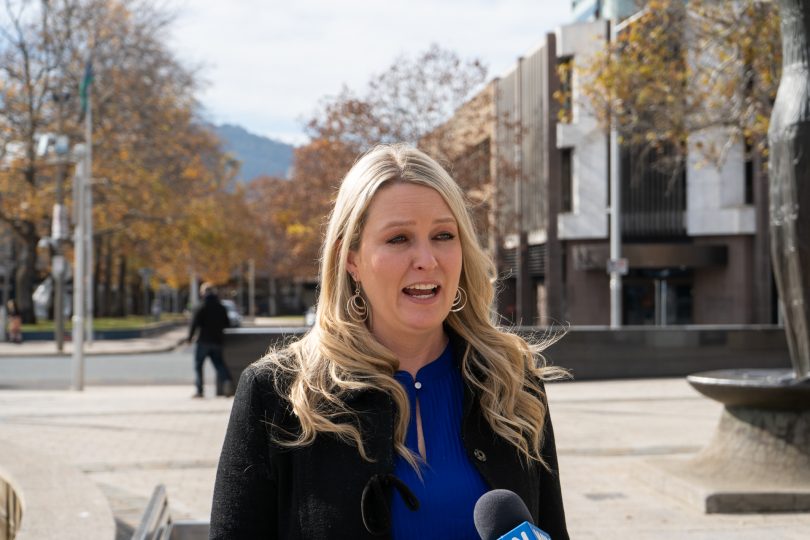
National advocates Grace Tame and Brittany Higgins have thrown their support behind the affirmative consent model. Photo: NPC Twitter/Facebook.
Advocates Grace Tame and Brittany Higgins have backed a bill to be introduced in the ACT Legislative Assembly this week that would make broad changes to the ACT’s consent laws, switching to an affirmative model of consent.
It’s being introduced by ACT Labor backbencher Dr Marisa Paterson who released a draft for public consultation last year. She’s hopeful it will pass by the end of the year.
ANU Global Institute of Women’s Leadership visiting fellow Ms Higgins said the introduction of the bill is a “turning point” for the ACT and formal acknowledgement that everyone is responsible for seeking enthusiastic consent.
“Someone isn’t saying ‘yes’ just because they don’t say ‘no’ or do not physically resist,” Ms Higgins said.

Dr Marisa Paterson will introduce the affirmative consent bill to the Legislative Assembly this week. Photo: Region Media.
Dr Paterson said the legislative reform set out by the bill is a critical step to deliver justice to victim-survivors of sexual assault.
“To victim-survivors, I am so sorry for what you have experienced. I will work tirelessly to ensure this bill passes and that the law explicitly states that sexual consent must be free and voluntary, and it must be communicated; otherwise, it is sexual assault,” Dr Paterson said.
An affirmative consent model is one under which consent must be actively communicated, so not saying ‘yes’ means ‘no’.
It’s a shift away from the ‘no means no’ model which can provide better protection to victim-survivors of sexual assault who may “freeze” and become unable to communicate a lack of consent.
Similar affirmative consent laws were passed last November in NSW.
After releasing a draft exposure bill last June, Dr Paterson said it has since received “overwhelming support”, and she thanked everyone who had contributed to the discussion.
She said some amendments have since been made to further strengthen its provisions.
The bill explicitly sets out circumstances where consent is not given, such as cases where a person does not say or do something to resist the act or cases where a person may have consented to another act with the same person.
It also outlines that consent is ongoing, can be withdrawn at any time and is not given just because a person “does not say or do something to resist the act”.
Consent is also automatically withdrawn if the person falls asleep or is rendered unconscious during the sexual activity.
A similar bill was introduced by former Greens MLA Caroline Le Couteur in 2018, but it proved contentious as it would have required a perpetrator to prove they knew consent had been given.
Adopting an affirmative consent model was recommended by a recent damning report into sexual assault prevention and response in the ACT.
The report found many victim-survivors were re-traumatised by their experiences with the system.
“It should not be enough to assume consent from silence or a ‘freeze’ response. Law reform and community education must ensure there is active consent before and during any sexual activity,” the report read.
It also called for other legal changes but noted reform needed to go beyond changes to the legislative framework.
There’s an alarmingly low prosecution rate for sexual offences in the ACT. In 2020, less than 3 per cent of sexual offences reported to ACT Policing resulted in charges being laid against the offender.
The bill will likely be referred to the Assembly’s Standing Committee on Justice and Community Safety.





















